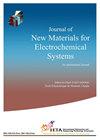基于超级电容的UPQC改善微电网电能质量的实时仿真
IF 0.6
4区 材料科学
Q4 ELECTROCHEMISTRY
Journal of New Materials For Electrochemical Systems
Pub Date : 2021-09-30
DOI:10.14447/jnmes.v24i3.a04
引用次数: 1
摘要
由于配电级消费者的能源需求加剧,可再生能源系统(RES)对微电网(MG)的渗透迅速增加。为了满足这一需求,消费者正在建立小型分布式可再生能源发电系统(DREGS),该系统主要由太阳能光伏系统组成。从DREGS向MG注入功率将引发潜在问题,如实际和无功功率失真、下垂/膨胀,这些问题会影响系统的电能质量。电压骤降和浪涌通常是由在高功率和低能量情况下发生的MG间歇性引起的。为了在间歇期间保持MG的电能质量,本文提出了一种将超级电容器(UC)与带有DREG的统一电能质量调节器(UPQC)集成在一起的方法。基本上,超级电容器是一种高功率、低能量密度的设备,可以补偿MG间歇性。该系统涉及超级电容器、UC充放电双向转换器和UPQC的控制和设计方面。UPQC将充当MG侧的动态电压恢复器(DVR)和负载侧的有源电力滤波器(APF)。利用Matlab/Simulink平台对所提出的系统进行了设计和建模,并对结果进行了分析。本文章由计算机程序翻译,如有差异,请以英文原文为准。
Real-time Simulations on Ultracapacitor based UPQC for the Power Quality Improvement in the Microgrid
Penetration of renewable energy systems (RES) into microgrid (MG) increases rapidly due to the intensified energy demands by the distribution level consumers. To meet this demand, consumers are erecting small scale distribution renewable energy generating systems (DREGS) which mostly constitutes of solar photovoltaic systems. Injecting power from the DREGS to the MG will rise potential problems like real and reactive power distortions, sag/swells which affect the power quality of the system. Voltage sags and swells are normally caused by MG intermittencies which occur at the high power and low energy situations. In order to maintain the power quality of the MG during intermittencies, an ultracapacitor (UC) is integrated along with a unified power quality conditioner (UPQC) with the DREGS is proposed in this paper. Basically, an ultracapacitor is a high power and low energy density device that will compensate the MG intermittencies. This proposed system deals with the control and design aspects of the ultracapacitor, a bidirectional converter for charging and discharging of UC, and a UPQC. The UPQC will act as a dynamic voltage restorer (DVR) for the MG side and an active power filter (APF) for the load side. The proposed system is designed and modelled using Matlab/Simulink platform and the results were analyzed.
求助全文
通过发布文献求助,成功后即可免费获取论文全文。
去求助
来源期刊

Journal of New Materials For Electrochemical Systems
ELECTROCHEMISTRY-MATERIALS SCIENCE, MULTIDISCIPLINARY
CiteScore
1.90
自引率
0.00%
发文量
33
审稿时长
>12 weeks
期刊介绍:
This international Journal is intended for the publication of original work, both analytical and experimental, and of reviews and commercial aspects related to the field of New Materials for Electrochemical Systems. The emphasis will be on research both of a fundamental and an applied nature in various aspects of the development of new materials in electrochemical systems.
 求助内容:
求助内容: 应助结果提醒方式:
应助结果提醒方式:


